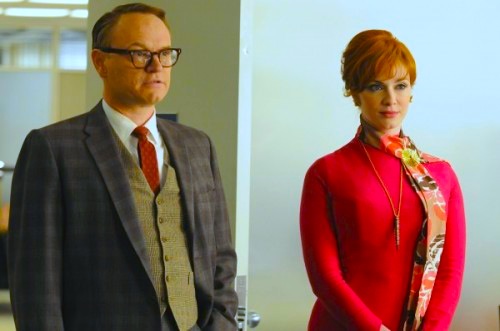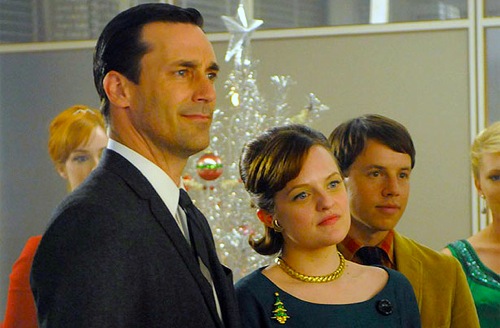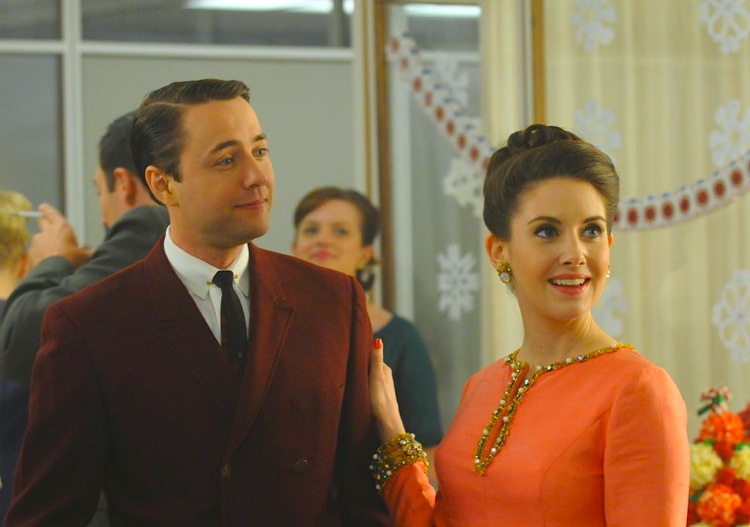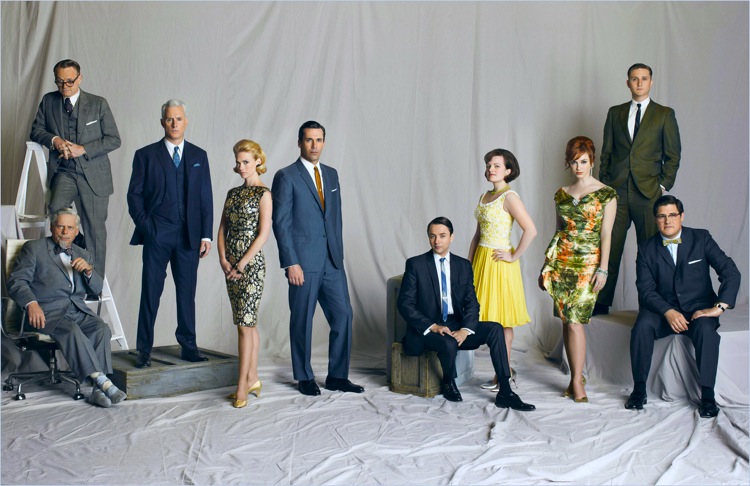By Jennifer Baldwin. “You’re never going to get me to do anything Swedish people do.” — Peggy Olson
This week’s episode of Mad Men was an episode of returns. There was the return of Creepy Glen the neighbor boy; the return of old fashioned (but endearing) ad man Freddy Rumsen (“Fredrick Van Rumsen!”); and most important of all, the return of the patented Joan Holloway Walk. When Joan struts her stuff, it’s not hard to see why Christina Hendricks is getting just as much buzz in the media (if not more) as Jon Hamm’s Don Draper.

Besides Joan and her Walk, I was also excited to see the return of Trudy Campbell (Allison Brie) and our second chance to watch “Trudy and Pete Do a Wacky Period Dance.” Last season we watched the Campbells do their best George and Mary Bailey imitation, dancing the Charleston. This time it’s the conga and Pete and his wife are in gung-ho form again. It’s moments like the office Christmas party conga line that make Mad Men such a treat. I will go on record as saying that I hate the way my generation dances, so I’m a little jealous to see how much fun Pete and Trudy made that conga line look.
There were also a number of funny lines in this week’s episode, particularly coming from Roger: “I feel like with my hair, you can’t see me in here” (speaking of his newly decorated, ultra-white office). John Slattery really does get all the best lines.
While “Christmas Comes But Once a Year” was a dark and rather depressing episode of Mad Men, it also boasted a number of witty lines and sparkling scenes. The episode really popped, from all of Roger’s scenes, to the aforementioned conga line scene, to the “Swedish way of love” scene between Peggy and her boyfriend. Matthew Weiner has a way of giving even his darkest episodes a light touch.
But make no mistake, this was a dark episode. The time is Christmas 1964, but the subject matter is all sex, both its uses and abuses. And what is the sexual act? What does it mean? Does it mean love? An escape from loneliness? A business transaction? Something purely physical, with no deeper meaning? Or do we avoid the “deeper meaning” at our peril?

Each of the story lines this week has a sexual undertone. Roger must prostitute himself as Santa Claus at the office Christmas party for a Lucky Strike executive, Lee Garner Jr. Joan dresses in a sexy red dress to please Garner — and to please Roger too, who begs her to wear “that red dress, the one with the bow on the back, makes you look like a present” (i.e.: sexual desirability as an object to be given and opened). Lucky Strike is Sterling Cooper Draper Pryce’s single biggest client (responsible for nearly seventy percent of their business), so everyone at the office Christmas party, from employees to spouses, must acquiesce to Garner’s every whim and “sell” themselves for his pleasure. They will allow themselves to be objectified and humiliated – particularly in a physical way – in order to keep Garner’s business.
The prostitution metaphor goes even further in the most important and shocking sexual encounter of the episode, when Don sleeps with his secretary, Allison (Alexa Alemanni). Up to this point in the show’s run, Don has made a point of not sleeping with anyone from the office. But with his personal life in near-ruin, coming home every night falling-down drunk, Don is having trouble keeping his professional standards. When he locks himself out of his apartment and calls up Allison to bring his keys from the office, soon he’s putting the moves on her and Allison (after an initial resistance) reciprocates. They have sex, but it’s unclear at first what this means for their relationship both personally and professionally.
We find out the next day at SCDP, of course, when Don brings Allison into his office and proceeds to act as if nothing happened the night before. It’s a terrible, cruel act from Don and we can see Allison reeling as she tries to remain placid and unaffected. Then Don gives her the Christmas bonus he promised earlier in the episode and dismisses her bluntly from the room. Allison returns to her desk, opens the Christmas card and finds two fifty dollar bills and Don’s salutation: “Thanks for all your hard work. Don.” With a hundred bucks and a Christmas card, she’s been reduced to a whore.
This is what the sex act has become for Don. First there was the actual prostitute on Thanksgiving in the first episode and now he has turned his secretary into one as well for his own sexual and emotional gratification. This is sex as money transaction, yes, but it also speaks to sex as a salve for loneliness. Several times in the first two episodes, Don has tried to seduce women he meets and these women reject him. He’s starved for some kind of physical encounter as a way to escape his loneliness. He finds it with Allison but then he responds by pretending it didn’t happen and by paying (however indirectly) her for her services. It’s heartbreaking for Allison, but as we’ve seen with the Roger/Lee Garner Jr. storyline, it’s all part of the job.

Peggy, too, spends the episode wondering about sex, trying to decide if she should finally have sex with her boyfriend, Mark. I think it’s very telling that Peggy has allowed her boyfriend to think she’s a virgin (Is she feeling guilty about her earlier sexual activity?). She tells him she wants to wait and he of course pressures her to give in, calling her “old fashioned.” She’s conflicted enough to even discuss the situation with Freddy Rumsen (Joel Murray) – king of old fashioned thinking with his Tallulah Bankhead and Barbara Stanwyck ad campaigns – who gives her “old fashioned” advice: If you want to marry him, don’t have sex; but if you’re not serious about him, don’t lead him on (“It’s very hard physically” you know, according to ol’ Freddy).
Peggy doesn’t want to be alone on New Year’s Eve (sex as cure for loneliness again?) and maybe she doesn’t want to be old fashioned – so she sleeps with the boyfriend. Did she ignore Freddy or is she actually taking Freddy’s advice? Perhaps she’s decided Mark isn’t husband material and that he’s just someone she can use to stave off her own loneliness (shades of Don using Allison?).
The picture Mad Men paints of 60s-style sexual “freedom” is anything but free – it’s people using other people, people using sex as a way to escape their loneliness, sex as product and economic transaction. The empty look Peggy has on her face after she sleeps with Mark; the cold, emotionless face Don puts on after his night with Allison; the humiliated, disgusted look on Roger’s face after he’s “sold” himself to Lee Garner Jr. all suggest that these acts have not made anyone happier or freer. Sex, when it’s divorced from love, simply doesn’t work. It’s all just a form of prostitution.
Other thoughts and notes from the episode:

Young Glen (Marten Weiner) has moved on from crushing on Betty to crushing on her daughter Sally (Kiernan Shipka). It was an interesting juxtaposition to show the way Glen trashed Betty’s house (except Sally’s room) as an act of love for Sally and the way the SCDP gang trashed the office during the Christmas party as a way to gain Lee Garner Jr.’s “love.” Both were infantile displays, but Glen’s – for all its disturbing, anti-social implications – was the truer act of affection, since he was inspired by a real emotional connection with Sally and not by monetary goals. He knows what it’s like to be the anguished child of divorced parents and to hate a house because one of the parents is now gone.
Rogers office! According to Freddy Rumsen, it “looks like an Italian hospital.” The giant mural of black polka dots on one wall looks like some kind of inter-dimensional time warp (Freddy again: “I feel like I’m getting sucked into that thing.”)
Pete’s maroon sport coat at the Christmas party!

A delight, and hilariously “Pete.” Have I mentioned that I love Pete and Trudy?
Joan does indeed wear the red dress with the bow on the back to the party as Roger suggested. What’s even more interesting is that we see Betty wear an almost identical red dress with a bow in the back when she and her family come home from some Christmas get-together. Is this Weiner’s way of implying Betty is a symbolic prostitute as well?
Bert Cooper and the guy from the Motivational Research Group discuss politics at the party and we’re given another indication that Cooper is an Objectivist/Libertarian when he comments on the recently passed Civil Rights Act: “Civil rights is a slippery slope.” (A subtle libertarian point Rand Paul tried to make earlier this summer.) Motivational Research guy responds: “If they pass Medicare, they won’t stop until they ban personal property.”
Who knows if Weiner intends these throwaway lines as jabs against conservatism/libertarianism, but I love them. Bert Cooper, especially, is a likable and fair-minded character and it’s nice to see such a character with right-leaning politics portrayed positively.
I’m not crazy about this new psychologist character, Faye Miller. She’s a bit clichéd; the woman psychologist who can size up Don right away and sees through all his tricks and B.S. (and of course she’s disgusted by the “conservative” politics of Bert Cooper and her boss.) She’s a psychologist and just happens to have all the right answers and observations. Bleh. It’s lazy writing to use a character as the author’s mouthpiece and I fear this is where Weiner might be going with Dr. Faye. She does, however, nicely sum up the main theme of the whole series: “It all comes down to what I want versus what’s expected of me.”
Finally, the song over the ending credits: “I Saw Mommy Kissing Santa Claus” by Teresa Brewer.
Posted on August 5th, 2010 at 10:29am.

I still wonder what “Mad Men” is all about.
You mentioned that there is one character that has some libertarian/conservative politics, but then that there is this new psychologist mouthpiece who disses this guy’s politics. You mention the conservative character Cooper’s comment that “Civil Rights is a slippery slope,” but I find that an offensive characterization by a liberal writer of what they think conservative politics is.
I’m a conservative and I’m completely for Civil Rights. There is no slippery slope about it. Republicans supported Civil Rights from Abraham Lincoln on, when right after the Civil War they they passed laws giving full citizenship rights to black Americans – rights that were then rolled back by the Democrats in the 1870s and 1880s in the hideous Jim Crow laws. In the 20th century, it was Eisenhauer, a Republican, who signed the first significant Civil Rights legislation of our era (which was opposed by southern Democrats).
If there are libertarians like Rand Paul or Ron Paul who oppose this stuff, then they are on the freakish minority fringe and do not represent conservatives. I have absolutely no idea what those guys are talking about, and I find them creepy and downright fascistic at times. The libertarians never seem to actually stand for freedom and are not real conservatives, since they do not support either fighting for freedom overseas (they oppose the Iraq War, for example), they continually made fun of Reagan for fighting Soviet Communism, they are derisive and completely disrespectful to religious faith, and now they oppose Civil Rights as well for some bizarre reason. All the libertarians seem to be interested in is money and acquiring more of it. This is why their single issue is having a free market – which I’m for too, but conservatism is about a lot more than that to me – such as having good values, defending this country, supporting the military, fighting tyranny, etc.
That is why I am still skeptical about this show and how fair it really is to normal conservative viewpoints.
Thanks for the comment Globetrottr! You are very right to point out the major differences between conservatives and libertarians. And that’s why I would characterize Bert Cooper as being more of an Ayn Rand libertarian/Objectivist (he even suggests Don read Atlas Shrugged in the first season), than a conservative. (For the record, I am not a libertarian. Also, I find Ron Paul’s foreign policy opinions to be disastrous and his courting of the despicable Truthers to be, well, despicable.)
As far as civil rights, I took Cooper’s line as being specifically about the Civil Rights Act of 1964, which, while I do in fact support the Act, I fully understand and can appreciate the libertarian arguments against it. The libertarian argument does not state that equal rights are bad or that discrimination against people based on race or color is a good thing. The concern is that parts of the Act were unconstitutional. With the 1964 Act, the government mandated what private companies could and could not do on their own property and there was concern at the time that this would lead to more overreach on the government’s part regarding private property further down the road. Barry Goldwater, in fact, voted against the bill, even though he had voted for all previous civil rights acts which came before him in the senate.
Now, I think the Civil Rights Act of ’64 was overall a good thing and that the good out weighs the possible negative consequences, but criticizing it on private property grounds does not make one a fringe kook nor a racist, unless you’re ready to call Goldwater a fringe kook and racist. That’s why I thought it was interesting that Weiner gave such a line to Bert Cooper, a character that is generally well-liked by the Mad Men audience. Was Weiner making a dig at libertarians or was he simply staying true to the character and the character’s politics? I don’t know, but I think Weiner has done a nice job in the past of presenting politics in a fair way that I’m willing to give him the benefit of the doubt.
Thanks again for the comment. Please keep ’em coming!
Thank you for your reviews of the show Jennifer. I rarely have time to watch TV nowadays, so it’s nice to be able to read your “Mad Men” reviews and find out what everyone is talking about.
I miss those old-fashioned dances. Everybody kind of just aimlessly gyrates nowadays, or does that ridiculous slow dance shuffle. Bring back the conga line!
Also agree with you on the sexual “freedom” that the 60’s supposedly brought. Yeah, it meant you could sleep around with anyone you wanted, but for women, I don’t know if it meant that they necessarily got treated any better in relationships.